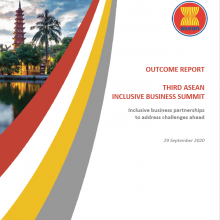Outcome Report of the Third ASEAN Inclusive Business Summit

Third ASEAN Inclusive Business Summit 2020
The Third ASEAN Inclusive Business Summit marked the continued commitment of the ASEAN Community to create an enabling ecosystem for inclusive business in collaboration with UNESCAP, iBAN, and the OECD. This outcome report presents the key highlights and main messages of the summit.
The Third ASEAN Inclusive Business Summit marked the continued commitment of the ASEAN Community, including government representatives, the private sector, investors and development organisations, to create an enabling ecosystem for Inclusive Business (IB) to thrive amidst the current Covid-19 pandemic. Present and future efforts made by ASEAN Member States’ governments to improve the framework conditions to foster enabling environments for IB will support companies in developing IB models and growing them to increase social impact and financial viability. They will also encourage and facilitate IBs offering services to underserved communities. Likewise, enabling environments will empower inclusive businesses to contribute to achieving a resilient, inclusive, people-oriented and people-centered ASEAN, as well as a pro-poor, inclusive, gender- and climate-responsive approach to recovery from the pandemic.
This outcome report presents the key highlights and main messages of the summit.
Improving regulatory frameworks at the national level
ASEAN Member States’ governments are fostering enabling environments for Inclusive Business by, for instance, improving regulatory frameworks at the national level. The Guidelines for the Promotion of Inclusive Business in ASEAN serve as a reference on how inclusive businesses can be supported at all levels and outline the institutional requirements to do so. They present twelve key policy recommendations that the ASEAN Member States and ASEAN policy makers may consider and implement as they see fit. The Guidelines were endorsed by the ASEAN Economic Ministers (AEM) during the 52nd AEM Meeting in August 2020 and were introduced during the Third ASEAN Inclusive Business Summit.
Given the diversity of socio-economic profiles and entrepreneur characteristics in the region, ASEAN countries are taking various approaches regarding IB. For instance, Indonesia has IB models in the wellness tourism industry and is now compiling a roadmap for promoting IB in this sector. Cambodia has incorporated nine of the twelve policy recommendations proposed in the Guidelines in its Inclusive Business enabling environment for Cambodia (IBeeC) strategy. The recommendations include the approval of a dedicated IB strategy and action plan, creating an IB coaching facility for potential and real IB companies, setting up an IB risk reduction fund to encourage IB investors and establishing a dedicated IB reporting system for monitoring and evaluation. IB is incorporated in Malaysia’s National Entrepreneurship Policy 2030, under the objectives of improving access to finance and financial inclusion for enterprises as well as promoting social entrepreneurship.
Providing recognition at the regional level
At the regional level, the ASEAN Business Advisory Council (ASEAN BAC), through its annual ASEAN Business Awards (ABA), awards inclusive businesses in ASEAN, as nominated by ASEAN Member States (AMS), to provide recognition and inspire more businesses to do good while achieving commercial returns. A set of IB Awards Selection and Nomination Criteria for AMS and ASEAN to evaluate the social impacts of businesses is proposed in the Guidelines on the Promotion of Inclusive Business in ASEAN.
Supporting medium, small and micro enterprises (MSMEs)
MSMEs’ capabilities and capacities need to be improved for them to be integrated into the value chain of medium and large businesses globally, as well as to get involved in IB models or themselves grow into IBs. This can be achieved by offering technical assistance, aggregation services and community organising, and facilitating access to finance and new markets. In line with this, the ASEAN BAC announced that it aims to partner with the ASEAN Responsible and Inclusive Business Alliance to make full use of the ASEAN Mentors for Entrepreneurship Network in preparing MSMEs.
Facilitating impact investment
In terms of impact investing, governments can play various roles as market facilitator, regulator and participant, in promoting enabling environments for impact investing through policies and strategies such as guiding roadmaps. For example, Singapore announced the development of a long-term strategy to make sustainable finance a defining feature of the country's role as a global hub for finance. The strategy will focus on Environmental, Social, and Governance (ESG) factors in the financing decision-making process, and on developing green finance solutions and leveraging innovation and technology.
Inclusive businesses, social enterprises and MSMEs that promote inclusive approaches can benefit from the improvement of framework conditions to foster such enabling environments by ASEAN Member States’ governments. Close coordination between ministries and the private sector at the national level are needed in ASEAN Member States to identify policy gaps and opportunities for IB partnerships and support timely responses towards the betterment of the IB environment. Enormous opportunities exist for cross-sectoral collaborations at both the national and regional levels in pursuing the inclusive business model as a vehicle to provide economic and social impacts.